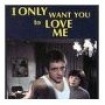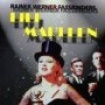Whity
| 片名: | Whity |
|---|---|
| 其它片名: | 威迪/怀惕 |
| 导演: | Rainer Werner Fassbinder |
| 编剧: | Rainer Werner Fassbinder |
| 摄影: | Michael Ballhaus |
| 声音: | Harry Baer |
| 剪辑: | Thea Eymèsz |
| 主演: | Hanna Schygulla, Katrin Schaake, Harry Baer, Ron Randell |
| 音乐: | Peer Raben |
| 片长: | 95分钟 |
| 年份: | 1970年 |
| 类型: | 剧情 |
| 国别: | 德国 |
| 语言: | 德语 |
| 格式: |
影片概述 . . . . . .
I barely got through this movie, this kind of half-western half super-dark satire on racism and slavery that makes Bamboozled look like Fraggle Rock... So why the high rating? Possibly just because there's nothing else quite like it. It's about a slave, dubbed Whity by his master/family for his propensity for 'sucking up' (Günter Kaufmann, a frequent actor in Fassbinder's stockade of sorts, who I still can't tell whether or not he's actually a good actor or appears to be so), and his master (Ron Randell) and his family, which includes a wife and two children, one retarded and one homosexual, and there are sometimes very strange requests or orders- like killing other members of the family for things like obvious adultery or the murder by the master of said adulterer (I think that's what happened at one point).
One of the things about the movie that's just totally weird, and yet very weirdly effective, is that the slave owner and family have white make-up put over their already white faces (again, the inverse of Bamboozled, only here not so smug about it being "hey, it's satire!"), and that all of the characters- save maybe for a few minor characters or a supporting one like the saloon singer who falls for Whity- have an affected way of speaking, deliberate like a everyone is under some strange spell. What is it all a symbol for? I think, maybe, that racism is so ugly and horrible a thing one can barely ever capture how it affects everyone around them, white or black (the only somewhat down-to-earth figure, Whity's mother played very convincingly by Elaine Baker, is all too brief in the mix for a reason). Fassbinder uses the backdrop of the old west, of a kind of fragmented version of it (he uses sets from other movies, intentionally I'd wager), where this savage but almost meditative story can take place.
Whity shouldn't be something to see right away if you're just getting into Fassbinder - since I'm one of them, I can attest to it being a difficult film - but there's a power about it, some really unique pull to it in some scenes (watch when Whity asks the retarded boy to come over the comb the horse, very tense, erotically so but cruel), that it's hard not to find it at some point if you become an admirer of the prolific German's oeuvre. I'm not even sure I would watch it again, but I know I didn't exactly regret the chance at witnessing risky art.
One of the things about the movie that's just totally weird, and yet very weirdly effective, is that the slave owner and family have white make-up put over their already white faces (again, the inverse of Bamboozled, only here not so smug about it being "hey, it's satire!"), and that all of the characters- save maybe for a few minor characters or a supporting one like the saloon singer who falls for Whity- have an affected way of speaking, deliberate like a everyone is under some strange spell. What is it all a symbol for? I think, maybe, that racism is so ugly and horrible a thing one can barely ever capture how it affects everyone around them, white or black (the only somewhat down-to-earth figure, Whity's mother played very convincingly by Elaine Baker, is all too brief in the mix for a reason). Fassbinder uses the backdrop of the old west, of a kind of fragmented version of it (he uses sets from other movies, intentionally I'd wager), where this savage but almost meditative story can take place.
Whity shouldn't be something to see right away if you're just getting into Fassbinder - since I'm one of them, I can attest to it being a difficult film - but there's a power about it, some really unique pull to it in some scenes (watch when Whity asks the retarded boy to come over the comb the horse, very tense, erotically so but cruel), that it's hard not to find it at some point if you become an admirer of the prolific German's oeuvre. I'm not even sure I would watch it again, but I know I didn't exactly regret the chance at witnessing risky art.
导演阐述 . . . . . .
获得奖项 . . . . . .
评论列表(0) . . . . . . ( 发表新评论 ) ( 更多评论 )
幕后花絮 . . . . . . (上传花絮) (展开所有)
影片图集 . . . . . . (更多/我要上传)
相关视频 . . . . . . (更多/我要分享)
对本影片资料作出贡献的会员 . . . . . .
4444(创建者)


















































